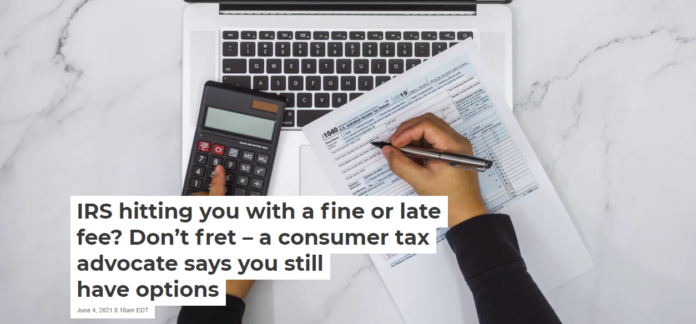
Rita W. Green, University of Memphis
Tax Day has come and gone, and you think you filed your return in the nick of time. But several weeks later you receive that dreaded letter in the mail from the Internal Revenue Service informing you of missing the deadline and failing to pay your tax bill on time. Your assessed tax penalty, based on what you owe, is $450.
This type of scenario is quite common, since penalties are assessed for over 40 million taxpayers each year, according to the Taxpayer Advocacy Panel’s 2020 report. There are numerous IRS penalties, but the three most common ones are failure to file a return on time, failure to pay the estimated amount owed from the past year and failure to pay after filing.
What many people don’t know is that the IRS offers several ways to reduce late fees and other penalties. Yet only a fraction of those who are eligible take advantage of them.
As a professor of accounting and a consumer advocate, I tend to be concerned when I identify a benefit that has been underutilized. I also serve as a volunteer on the Taxpayer Advocacy Panel, an independent body that aims to help the IRS improve based on outreach and feedback from the general public.
We recently discussed the low utilization of a key penalty relief program, which prompted me to write this article.
Applying for penalty relief
The main form of relief the IRS offers to taxpayers is the first-time penalty abatement policy, which was introduced about two decades ago. It covers penalties related to a failure to file, a failure to pay or a failure to deposit the estimated taxes owed.
This program can lead to a reduction or even removal of a taxpayer’s penalty – though not the tax liability – if you meet certain conditions:
- You didn’t previously have to file a return – because you earned too little money, for example – or you’ve had no penalties for the previous three years.
- You filed all required returns or extensions.
- You paid or arranged to pay any tax due.
It’s also available to taxpayers who live in areas affected by specific disasters for whom the tax deadline has been extended.
If you currently meet the first two requirements, you can still make arrangements to pay the tax you owe and then request the abatement.
In 2019, only 12% of the penalties for failure to file and failure to pay were abated.
The most common reason for the low number of abatements appears to be that many taxpayers who would otherwise qualify for relief aren’t aware this program even exists. Requesting relief is as simple as phoning the IRS and requesting it, or you may ask for it in writing.
Other resources available
In addition to penalty prevention and penalty relief, other resources are available to taxpayers who need help after Tax Day.
The taxpayer advocate service is an independent organization within the IRS, and its local taxpayer advocates provide free help to any taxpayer to provide guidance through the process of resolving tax problems. There’s at least one in every state.
The IRS also supports Low-Income Tax Clinics, which are staffed with attorneys and other professionals to help low-income filers with tax disputes that may require legal intervention. While it can be difficult to reverse penalties or challenge other IRS decisions, taxpayers with legal help stand a much better chance of succeeding with their claims.
[Like what you’ve read? Want more? Sign up for The Conversation’s daily newsletter.]
An ounce of penalty prevention
Many people may be familiar with Benjamin Franklin’s assertion that “an ounce of prevention is worth a pound of cure.”
No one enjoys paying taxes, but additional penalties can make a bad situation even worse. The good news is most penalties can be avoided by filing taxes on time and paying any taxes due. If you are unable to pay all of the taxes due right away, you can always establish a payment plan.
So next year, remember there are many resources available to you to make it easier to file on time – free, in most cases – and to avoid penalties. And taxpayer advocates are available to answer any tricky questions.
Rita W. Green, Instructor of Accountancy, University of Memphis
This article is republished from The Conversation under a Creative Commons license. Read the original article.




















